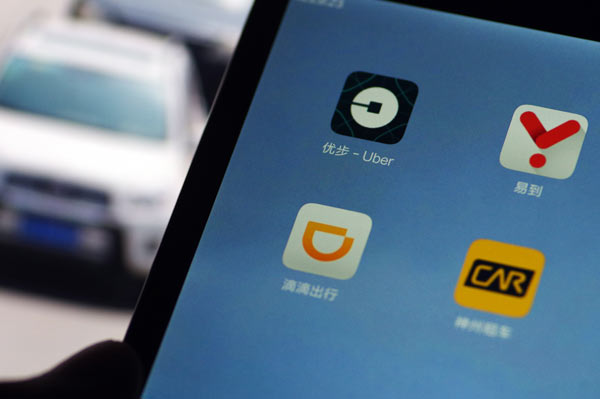Didi's Uber deal must not be at customers' expense
Updated: 2016-08-04 07:13
(China Daily)
|
|||||||||
 |
|
A mobile screen shows the logos of ride-hailing apps including Didichuxing, Uber, Yongche and UCAR. [Photo/VCG] |
Didi Chuxing and Uber China, the two biggest app-based ride-hailing service providers in China, have made huge losses in the past two years because of the subsidies they have provided drivers and customers in their competition for market share.
So the deal for Didi Chuxing to buy Uber's China operations, which will see the two on-demand ride providers retain their distinct brands and apps while merging their backends, will help save costs.
However, the deal, announced on Monday, will create a $35 billion ride-hailing juggernaut that will control more than 90 percent of the market, raising concerns that it could take advantage of its dominant position to the detriment of both users and competitors.Two days after the announcement of the deal, there have been media reports that Didi and Uber China have already cut their subsidies for drivers and raised their fares.
In fact, China has a regulation stipulating that any merger or acquisition in the country requires approval if the total turnover of the companies involved exceeds 2 billion yuan ($302 million) in the most recent fiscal year. The Ministry of Commerce, one of the Chinese regulators in charge of anti-trust affairs, has stated that the two companies will have to file their deal with the ministry for approval before it can go ahead.
Although it is estimated that the combined turnover of Didi and Uber China meets the filing requirement, Didi has said that since both companies are loss-making, it does not need to gain approval for the deal.
Obviously, the two sides have different interpretations of the filing rules. The mixed messages from the ministry and Didi testify to the challenge facing regulators with the emergence of internet technologies.
A case in point is the vicissitude surrounding the fate of mobile app-based ride-sharing services, which used to be seen as illegal but were finally legalized following the release of new regulatory rules last month.
It is time for the authorities to clarify the situation and respond to the concerns of the public.
Despite the regulatory challenges posed by technological innovations, the core regulatory principle should be encouraging competition and innovation while preventing monopolies from disrupting the market order.
Having a dominant market share might not necessarily lead to it being exploited, but it has the potential to reach that point. The authorities must closely monitor developments in the market to safeguard the core regulatory principle.
Related Stories
Yongche steps up drive to do battle with Didi 2016-08-03 07:37
Didi, Uber yet to submit merger papers to ministry 2016-08-02 15:05
Rivals Didi and Uber to join forces 2016-08-02 08:11
Didi Chuxing confirms merger with Uber China 2016-08-01 17:10
Today's Top News
Ukraine's Savchenko on hunger strike
Chinese tourists robbed in France
5 feared dead as Russian helicopter shot down
China influence can soften blow of Brexit
Turkey summons German diplomat over Cologne rally
Khan parents chide Trump for lack of empathy
Lunar probe confirms no water on the moon
'China's Challenges' wins historic Emmy Award
Hot Topics
Lunar probe , China growth forecasts, Emission rules get tougher, China seen through 'colored lens', International board,
Editor's Picks

|

|

|

|

|

|







